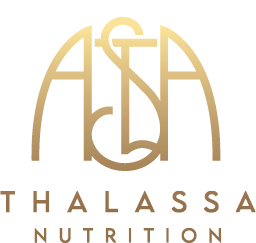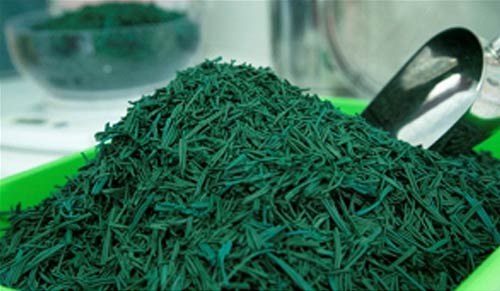WHAT DOES SPIRULINA CONTENT ?
WHAT DOES SPIRULINA CONTENT ?
With over 100 nutrients, Spirulina is often described as the most complete food source in the world. The American National Aeronautical and Space Agency includes it in their astronauts diet and plans to grow Spirulina in it’s space station. It’s easy to see why.
Japan has some good examples of some Japanese seniors who have only relied on Spirulina and water for more than 20 years showing how good is Spirulina for the human body.

Spirulina is often deemed the most nutritionally complete of all food supplements, containing a rich supply of many important nutrients, including protein, complex carbohydrates, iron, and vitamins A, K, and B complex. It also has a high supply of carotenoids such as beta carotene and yellow xanthophylls which have antioxidant properties. It is also rich in chlorophyll, fatty and nucleic acids, and lipids. Thus, spirulina has countless uses as a supplement for maintaining good health and for preventing diseases.
Spirulina is the richest beta carotene food, with a full spectrum of ten mixed carotenoids. About half are orange carotenes: alpha, beta and gamma and half are yellow xanthophylls.Synthetic beta carotene has not always shown these benefits. Research in Israel showed natural beta carotene from algae was far more effective. Natural is better assimilated and contains the key 9-cis isomer, lacking in synthetic. As suspected, natural carotenoids in algae and vegetables have the most antioxidant and anti-cancer power.
Spirulina is an ideal anti-aging food; concentrated nutrient value, easily digested and loaded with antioxidants. Beta carotene is good for healthy eyes and vision. Spirulina beta carotene is ten times more concentrated than carrots.
Iron is essential to build a strong system, yet is the most common mineral deficiency. Spirulina is rich in iron, magnesium and trace minerals, and is easier to absorb than iron supplements.
Spirulina is the highest source of B-12, essential for healthy nerves and tissue, especially for vegetarians. Having said that, there does seem to be lots of evidence that the Vit B12 is in a slightly different form than that which can easily be absorbed by Humans, so it is debatable how much good this B12 will do you. It seems to be only the B12 there is this absorption issue with though, and the rest of the nutrients do seem to be bio-actively available to the body.
Healthy Dieting with Spirulina
About 60% of spirulina’s dry weight is protein, which is essential for growth and cell regeneration. It is a good replacement for fatty and cholesterol-rich meat and dairy products in one’s diet. Every 10 grams of spirulina can supply up to 70% of the minimum daily requirements for iron, and aboutthree to four times of minimum daily requirements for vitamins A (in the form of beta carotene), B complex, D,and K. By itself, it does not contain vitamin C, but it helps maintain this vitamin’s potency.
Spirulina is rich in gamma-linolenic acid or GLA, a compound found in breast milk that helps develop healthier babies. Moreover, with its high digestibility, spirulina has been proven to fight malnutrition in impoverished communities by helping the body absorb nutrients when it has lost its ability to absorb normal forms of food.
Another health benefit of spirulina is that it stimulates beneficial flora like lactobacillus and bifidobacteria in your digestive tract to promote healthy digestion and proper bowel function. It acts as a natural cleanser by eliminating mercury and other deadly toxins commonly ingested by the body.
Spirulina also increases stamina and immunity levels in athletes, and its high protein content helps build muscle mass. At the same time, it can curb hunger that may develop during the most demanding training routines. Thus, it indirectly acts as an effective way to maintain an athlete’s ideal body weight.
The Disease Fighter
As well as beta carotene, Spirulina contains other nutrients such as iron, manganese, zinc, copper, selenium, and chromium. These nutrients help fight free radicals, cell-damaging molecules absorbed by the body through pollution, poor diet, injury, or stress. By removing free radicals, the nutrients help the immune system fight cancer and cellular degeneration. In some findings, spirulina has helped reduce oral cancer tumors in laboratory rats, and may thus provide a big medical breakthrough in cancer treatment.
Spirulina’s ability to reduce the bad cholesterol LDL in the body helps prevent the onset of cardiovascular diseases, such as hardening of the arteries and strokes. It also helps lower blood pressure. While not clinically proven, spirulina may also protect against allergic reactions and liver infection.
Removing Toxins
In 1994, a Russian Patent was awarded for spirulina as a medical food to reduce allergic reactions from radiation sickness. 270 Children of Chernobyl consuming 5 grams a day for 45 days (donated by Earthrise Farms), lowered radionucleides by 50%, and normalized allergic sensitivities. Today we are subject to an onslaught of toxic chemicals in our air, water, food and drugs. Our bodies need to continually eliminate these accumulated toxins. Spirulina has a completely unique combination of phytonutrients – including chlorophyll, phycocyanin and polysaccharides, that can help cleanse our bodies.

PHYCOCYANIN is being studied more and more by scientists in recent years. The word “phycocyanin” comes from the Greek word for Algae “phyco” and the Greek word for blue “cyan.” Phycocyanin is an amazing water-soluble blue pigment that gives Spirulina its bluish tint. Phycocyanin is only found in blue-green algae like Spirulina—you can’t get it in other foods. Phycocyanin is one of the key ingredients that makes Spirulina such a wonderful, health-enhancing superfood, and a vital difference between spirulina and other foods like chlorella, wheat grass and barley grass.
Phycocyanin is a powerful water soluble antioxidant. Scientists in Spain shows that an extract of Spirulina containing phycocyanin is a potent free radical scavenger and inhibits microsomal lipid peroxidation. (Pinero et al, 2001). Spirulina has many different types of antioxidants, and the unique nature of phycocyanin makes Spirulina a level above other antioxidant foods or formulas. It is the phycocyanin in Spirulina that is thought to help protect against renal (kidney) failure caused by certain drug therapies administered in hospitals. Phycocyanin has also shown promise in treating cancer in animals and stimulating the immune system (Iijima et al 1982). A recent study showed that phycocyanin is a powerful anti-inflammatory (Reddy et al 2000). It has also been shown to inhibit the allergic inflammatory response (Remirez et al 2002). Phycocyanin combats inflammation as a Cox-2 inhibitor. Prescription Cox-2 inhibitors can damage the liver, but phycocyanin actually helps the liver.
A great deal of research has been done in Japan on phycocyanin. The Japanese have found the phycocyanin protects the liver and the kidneys during detoxification, as well as activating the immune system. Researchers at the Osaka Medical Center for Cancer and Cardiovascular Diseases said: “Spirulina is surmised to potentiate theimmune system leading to suppression ofcancer development and viral infection.” Their human clinical study showed that a hot water extract of Spirulina rich in phycocyanin increased interferon production and NK cytotoxicity (cancer killing cells) when taken orally. (Hirahashi et al, 2002). Continue on for more eye-opening information.
Another study indicated that Spirulina had an anti-arthritic effect in mice, which they said may be due to the anti-inflammatory and antioxidant properties of phycocyanin (Remirez et al, 2002).
Study in Cuba concluded that phycocyanin isantioxidant, anti-inflammatory, neuroprotective (brain) and hepatoprotective (liver) effects (Romay et al 2003). Their work was done both in-vitro and in-vivo. In 12 experimental modules of inflammation, phycocyanin exerted a dose-dependant anti-inflammatory effect in every case. These scientists also found that phycocyanin reduced levels of tumor necrosis factor in mice and showed neuroprotective effects in rats.
An interesting study was done in Ukraine (where Spirulina had previously shown effectiveness in removing radioactivity from the urine of children suffering from high levels of radiation from the Chernobyl nuclear accident). This study was done with rats that were exposed to x-rays. The study found that rats fed phycocyanin experienced a correcting effect of the radiation exposure
Who should take Spirulina?
- Children who don’t like or get enough vegetables and or have an imbalanced food intake.
- Teenagers during their rapid growing period need a sufficient injection of nutrients. Spirulina is ideal for this.
- Pregnant mums who need extra nutrients.
- Seniors who have difficulty in having reasonable average 3 meals per day.
- Sport lovers or athletics who need extra nutrients to keep their energy levels up.
- Modern busy people who don’t have the time to eat good meals.
- Patients or people who need high volumes of nutrients to assist recovery (please consult your doctor)
- Vegetarians who require extra nutrient sources
Who shouldn’t take too much Spirulina?
- People with hyperparathyroidism
- People who have serious allergies to seafood or seaweed.
- Patients current experiencing high fever.


 no
no no
no
Leave a Reply
Want to join the discussion?Feel free to contribute!